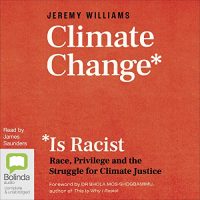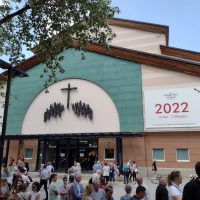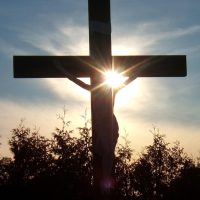Reflection given by Revd Sue McCoan
I’m sure we’ve all been aware, over the last couple of months, of our loss of freedom. Last weekend, in anticipation of the government reviewing the lockdown on Sunday, there were headlines in the papers like ‘Freedom Monday!’ Yesterday, there were people gathering to protest against lockdown, demanding freedom to assess their own risks. So this week, I have been reflecting on the idea of freedom. It’s a huge topic; I’m going to offer three pictures of different aspects of freedom, along with our bible reading, and then see what we can draw from it all.
I’m beginning with a story from the French writer Alphonse Daudet, the story of M Seguin’s goat. This is not a funny story.
M Seguin bought a little white goat. She was beautiful, with her black hooves and shiny little horns, and he was determined to treat her well. He kept her in a pretty field with plenty of grass, tethered to a good long rope; at night she slept in a cosy shed.
But beyond the field, the goat could see the mountains, with trees waving in the wind. And her little heart longed for the freedom of the wild. One day, she said to M Seguin, ‘Let me go to the mountains to run around’. M Seguin was very sad. ‘I have had other goats who went to the mountains. Every one was eaten by the wolves’. And that night, he locked her into the shed. But he had forgotten the open window. Early the next morning, as the sun rose, the little goat climbed up, scrambled through, and ran off to the mountains.
Oh, the delight of the open space, the trees, the fresh mountain air! The goat leapt for joy, full of energy and life. What a day she had, feasting on wild herbs, drinking from mountain streams. All the freedom she could wish!
The sun began to go down, and the air grew cool. The little goat thought of M Seguin and his cosy shed. But she wouldn’t go back now. And then, as darkness fell, she heard the howl of the wolf… and saw the two yellow eyes.
‘So soon’, said the little goat.
She fought, she fought so bravely, with her two little horns. She fought all night. But as dawn came, her strength gave out, and she died.
I heard that story when I was studying for French A-level; it’s haunted me ever since. Partly because it’s so sad, but also because it’s ambiguous. Is it a warning against wanting too much freedom? Or, for the goat, was the day of life worth the price?
I’ll leave that with you to ponder.
Let’s turn now to our bible reading. This follows on from the reading we heard last week, Jesus giving his disciples last words of encouragement before his death.
Bible reading John 14:15-21
Jesus tells his disciples to keep his commandments, and that he will send the Spirit of truth. At first sight, that might not look much like freedom; we don’t like being told what to do. We’ll come back to this later.
Here’s another image of freedom. I am free, in this country, to eat as many potatoes as I want. They are cheap and easily available; even in recent weeks there has been no limit on potato-buying. And I really like potatoes, pretty much in any way they can be cooked. But when the GP rings me, and says, ‘you are borderline diabetic, lay off the starchy carbs’, then I also have the freedom to choose not to eat potatoes, for the sake of my longer-term health. Sometimes it’s worth sacrificing smaller freedoms, for the sake of greater ones.
Here is our third picture for today, about freedom and truth.
The other day, Jamie and I watched the film ‘Lincoln’ – Daniel Day-Lewis doing his barnstorming performance as Abraham Lincoln. The film is set during the 4th year of the Civil War, and when Lincoln is trying to get through the 13th Amendment to the American Constitution which would outlaw slavery. Now. The Civil War was essentially the Southern states fighting to keep slavery. If the Amendment goes through, they have nothing to fight for; it will end the war. So the bill has support as a means to peace. But then the prospect is raised: what if the war ends before the amendment is agreed? Well then a lot of the support goes – because underneath, people are fearful of what will happen if the slaves are freed.
Lincoln is offered the chance to make peace before the crucial vote. That gives him a real dilemma. Everybody wants to end the war – but he would lose the amendment. Slavery would continue.
Lincoln decides he has to meet the Southern peace envoys. But while he’s in the cable office, to send them the invitation, he gets into conversation with one of the cable engineers. Lincoln talks of mathematics, and Euclid’s proposition that if two things are equal to another thing, they are equal to each other. And, as he says that, he realises that the Amendment is not just a good thing, it is fundamental to the principle that all men are created equal. It is essential for humanity that the bill is passed.
He changes the cable. He invites the peace envoys to go to Richmond Virginia and wait for further instructions. They are still there, and still waiting, when the vote takes place. The Amendment is passed by the narrowest of margins.
With these three pictures in our minds, let’s go back to our bible reading.
Jesus says, he will ask God the Father to send the Spirit of Truth. It is the Spirit of Truth, I think, that is at work in Abraham Lincoln – we might also call it the spirit of discernment – that ability to see, amid all his responsibilities, which was the one that really mattered.
We will pray for that spirit of truth and discernment when we come to decide how and when to meet for worship again: how can we keep everyone safe, and how can we include the people who are not safe to come to the church building just now.
And Jesus says, keep my commandments. That includes all the teaching he’s given them so far, plus the new commandment to love one another.
The people who were protesting yesterday were complaining about freedoms that mainly boil down to not being able to do what they want, when they want. ‘Why can’t I meet friends, have a meal out, use the tube?’ The short answer is, you might be fine, but you are increasing the risk for transport staff and other workers who have no choice but to be out and about. Loving one another means choosing to limit our own freedoms, for the sake of the greater freedom of us all being able to manage this disease.
The thing about the commandments of Jesus is that we are not given them as instructions to follow as best we can. Jesus gives them as a means of keeping in relationship: ‘I am in my Father, and you in me, and I in you’. And this from Jesus who gave his life, not for his own freedom, but for ours. In keeping his commandments, we find our true freedom, our true lives.
Let me end with a very old Christian prayer which I think sums up what I’ve been trying to say.
Eternal God,
Light of the minds that know you,
The life of the souls that love you,
The strength of the wills that serve you;
Help us so to know you that we may truly love you;
So to love you that we may fully serve you
Whom to serve is perfect freedom.
Amen.






